- Home
- Simon Kernick
The Hanged Man (Bone Field 2) Page 26
The Hanged Man (Bone Field 2) Read online
Page 26
She pulled a pair of plastic gloves and a set of lock picks from her backpack and checked the front door. It was locked, the lock itself a new six-pin Yale.
Most members of the public didn’t realize it but housebreaking is an important part of policework, and Tina had learned to pick locks in her first plain-clothes role as a DC in Islington CID. If you want to bug a suspect, you have to get into his or her home somehow. The most important thing is to leave no trace of your presence.
Six-pin locks aren’t easy to get through, and it took Tina close to three minutes of wrangling with a torsion wrench and hook pick before she heard the familiar click, and the handle turned. She was inside.
Feeling the adrenalin surge that always comes with the closeness of danger, Tina put her head slowly round the door. The hallway was empty, and she could hear the music coming from the far end of the house. Quickly, she moved inside and shut the door behind her.
The staircase was in front of her with a door built under it. As Tina approached she saw the door was both locked and bolted, which was interesting. Once again the lock was a new six-pin Yale, but she decided to leave picking it for now.
Instead she headed up the stairs, moving fast. It was obvious which of the bedrooms was Anthea’s – actually a suite of opulently furnished rooms, hidden behind double doors, with a balcony directly above the veranda where Anthea and Katy continued to eat and talk. The balcony doors were open, showing a view of the wheat field Tina had approached from, and the line of trees beyond where she’d parked her car, and which was now disappearing into the shadows as darkness fell.
Tina could hear Anthea asking Katy if she’d like to stay a couple of weeks longer with her at the house, rather than hurry off to France. Tina couldn’t quite hear Katy’s reply but from her tone it sounded like she was happy to stay for longer. Tina had no doubt that Katy had been earmarked for death, like Tracey Burn, and that France was just a ruse to throw any interested parties off the scent. But it seemed the visit from Ray and Dan had spooked Anthea, and she was now playing for time so she and the Bone Farm killers could work out their next move.
If Tina’s theory was true then Anthea Delbarto was a truly cold bitch.
There was a yucca plant in one corner of the room, and Tina secured a tiny battery-operated video camera to one of its branches with thin black wire. She then methodically went through Anthea’s drawers and cupboards, looking for anything of interest. In the living room there was a desk with a locked drawer. This one was easy to pick and contained a laptop but no mobile phone. Tina checked the laptop but it was password-protected. She didn’t have the necessary technical know-how to break in and plant keypad-logging software, and it would be impossible to plug in a hardware-based keypad logger without it being discovered. She thought about taking the laptop with her and paying one of her hacking contacts to break in for her but it was too risky. Instead she replaced it in the drawer and used her picks to re-lock it.
Anthea was clearly very careful not to leave around anything that might incriminate her so, after planting a second camera in the lampshade above her head, and angling it so it was pointed at the desk, Tina crept back downstairs.
Having broken into a number of homes in the past, her ears were well attuned to the sound of movement, and she could hear nothing as she crossed the hallway to the front door. But, as she opened it, she paused, looking back at the door under the stairs. If Anthea had been grooming women for murder at the farmhouse in Wales, then she was almost certainly still involved with devil worship. But Tina had seen no sign of any satanic regalia upstairs.
She knew she should simply walk out of the door now, head back to the car, and drive home to wait for Ray. This would have been the logical move. But Tina had always been a woman to take risks. If there was anything beyond that door, she wanted to see it, and now was her best chance, while the women were still outside enjoying the balmy evening.
Having made her decision, she pulled out the pick set, inserted the torsion wrench into the lock and got to work, conscious that at any moment she could be discovered.
But, of course, that was part of the excitement. And Tina had always thrived on the dangerous, more physical aspects of policework. She loved the thrill of adrenalin that she got from chasing and capturing criminals, from facing down danger and, in truth, from winning. In her lifetime, she’d killed four men. Three had been classed as self-defence. The fourth no one knew about. But she still considered herself very much on the side of the angels, and in her professional life she’d never done anything that she later regretted. She’d ridden her luck, but so far had ridden it well, and if the time did ever come for her to settle properly and have children she knew she’d be able to look back and be proud of what she’d achieved.
The lock took two and a half minutes – thirty seconds faster than the front door. The only problem was the bolt. Once she opened that it would be obvious to anyone walking past that someone had been tampering with the door. To counter this, she moved it just enough for the door to open, then stepped inside.
It was pitch black when she shut the door behind her and switched on the torch. She was at the top of a single flight of concrete steps leading down into the gloom. The cellar smelled of damp and disinfectant and she descended the steps carefully, then ran her torch across the room.
She saw it straight away.
A huge pentacle sign with a flowing ‘M’ in the middle painted on the wall in front of her.
It was exactly what she’d been looking for.
Fifty-seven
The rendezvous was a single-track, tree-lined road with a gentle hill running up one side. I arrived fifteen minutes early, parked my car by the entrance to the quarry on my left, and got out, looking up towards the hill, which was mostly covered in trees with patches of grass between, and wondered if anyone was watching me. It was getting dark now so it was hard to tell, and I couldn’t hear anything except the sound of birds, and the vague hum of traffic coming from the main road a few hundred metres away. I’d checked the spot on Google Maps and there were no residential buildings around for a good half mile. I wasn’t sure if this was a good or a bad sign, but part of me didn’t like being so far away from any help.
Before I’d made the turn on to the single-track road, I’d called Dan, just to let him know I was here, and he’d told me he would park up on the other side of the main road and wait for me there. He’d sounded tense, which surprised me, given that it was me who was exposed out here and not him, but I guessed he was just eager to get hold of Hugh Manning.
But for the moment at least there was no sign of Manning. I walked back round to the other side of the car so I couldn’t be seen so easily from the hill, and leaned against it, keeping low and watching. I wasn’t particularly nervous myself. There were two reasons for this. One, I thought Manning was genuine in his desire to give himself up. Two, and more importantly, I had the Walther P99C in the back of my waistband underneath my shirt, which as far as I was concerned left me ready for any eventuality. I didn’t want to fire it, and couldn’t envisage a situation in which I was going to have to tonight, but a gun’s always a good confidence booster when you’re in an unpredictable situation, especially when you know how to use it. And I did.
My phone started ringing. Once again the call was from an unknown number.
‘I see you’ve arrived,’ said Hugh Manning. He too sounded nervous.
‘I have,’ I said, looking up at the hill. ‘And I’m alone.’
‘I can see that. Thank you.’
‘Where are you?’ I asked him.
‘Keep driving to the end of the road. Then turn right and follow the road round a large ninety-degree bend. Go very slowly after you hit the bend, five miles per hour maximum, and I’ll call you then.’
I got back in the car and threw my phone on the passenger seat, eager to get this over with. I could understand Manning’s caution – there was, after all, a price on his head – but I wasn’t prepared to be messe
d about much longer. It was getting late and I wanted to get home and see Tina. She’d texted me over an hour earlier to tell me she was near Delbarto’s home but was still trying to work out the best way in, and I hadn’t heard from her since. I knew better than to text her when she was on a job but I was going to be a lot happier when I learned she was safe and on her way home.
I didn’t need to call Dan to tell him where I was going. He could hear everything I said through the mike he’d given me, which was attached to my shirt collar, so as I followed the road down to the end I repeated the instructions I’d been given for his benefit. I turned right on to another single-track lane with thick tree cover on either side which, I noted ruefully, was perfect for an ambush. The bend appeared and I followed it round, slowing right down and instinctively keeping my body low in the seat, comforted by the weight of the gun in my waistband.
The phone rang again – the same unknown number – and I picked up.
‘In a few seconds you’ll see an old building on your left. Drive down to the entrance and get out.’
‘If you’re not there this is off,’ I told him.
There was a pause, and I thought he was going to say something, but he ended the call instead.
Again I repeated what I’d just been told into the mike for Dan’s benefit, and as I finished speaking a clearing opened up in the trees to reveal what looked like an abandoned barn with a corrugated-iron roof, backing on to a lake. The best light now was provided by the moon, and I couldn’t see anyone there, not even a parked car.
A potholed driveway led down to the building and I took it, still driving slowly, watching the trees on either side for any sign of movement. I wondered why on earth I was doing this at nearly half nine on a Saturday night when the rest of the world was out enjoying themselves, especially as I was no longer even a cop. But of course I knew the reason. It was etched on my heart.
Dana Brennan. I was doing it for her and, if she was somewhere up among the stars looking down, I hoped she was watching me now.
I stopped the car, whispered into the mike that I was getting out but couldn’t see anyone, and pushed open the driver’s door. I got out very slowly, keeping low so that I presented as small a target as possible, and looked towards the building.
The front door was open and hanging off by one hinge, and I was just about to call out when a voice I recognized came from inside. ‘I’m here,’ said Manning, and his head appeared round the doorway like something out of a cartoon. He was a good-looking guy with thick black hair and cupid lips, and his time as a fugitive didn’t seem to have had any adverse effects physically. He still looked a lot younger than his forty-eight years.
I’d expected to feel an excitement when I finally got hold of him, but I didn’t. I just felt a deep-seated weariness.
‘Thank God for that,’ I said, exhaling wearily. ‘Now, let’s go.’
‘I thought I heard something,’ he said, coming out of the door and looking round carefully. ‘A car.’
I listened, but could hear nothing aside from the breeze, although I noted that the birds had stopped singing.
‘I told you,’ I said, ‘I came alone, and I’m impressed that you managed to see me arrive from all the way over here.’ It was clear Manning had had some help tonight, and probably for the past few days as well, but I wasn’t going to press him on it. I had him now, and that was the main thing.
He walked over and shook my hand. He had a strong grip. ‘Thank you for coming.’
‘Sure,’ I said, and started back to the car.
‘Hold on,’ said Manning and, as I turned round, I saw him pull a phone from his pocket and examine the screen, before looking back at me with a mix of mistrust and fear. ‘Another car’s just come past the spot where you first parked. A black SUV. Moving fast.’
I frowned. ‘How do you know?’
‘We set up a camera on one of the trees. That’s how I saw you.’
‘That car has nothing to do with me.’
‘And it’s nothing to do with me either. Who else knows about this?’
‘Only one other person knows I’m meeting you tonight, and that’s a colleague of mine. He’s my back-up.’
‘I told you to come alone,’ Manning said angrily.
I ignored him, listening out for the sound of a vehicle.
‘I can’t hear anything,’ I said.
‘It could be an electric car or a hybrid,’ Manning snapped, his voice tense. ‘They don’t make noise. But they’re definitely on their way.’
We both ran to the car and got in, and I did a rapid U-turn.
‘Is there a back way out of here?’ I asked him.
He nodded frantically. ‘Yes. Take a left. I’m not sure of the exact way but it takes us back on to the main road.’
I pulled out my phone and put in a call to Dan as I reached the single-track road. That was when I saw the SUV approaching from the right, only twenty metres away.
I turned the wheel hard left just in time to see that there was another SUV coming that way as well.
We were trapped.
‘Oh Jesus,’ wailed Manning. ‘You lied to me!’
I hadn’t of course, but one way or another I couldn’t argue with this, nor was it a good time to work out how the Kalamans had found out about the meet. Instead, I threw down the phone and slammed the car into reverse, driving rapidly back towards the barn.
‘Do everything I say,’ I told him, pulling the Walther from my waistband and flicking the catch from Safe to Fire, the adrenalin pumping through my system as the two SUVs turned into the clearing in front of us, barely fifteen metres away. Already I could see men with scarves pulled over their faces leaning out of the windows with automatic weapons at the ready.
‘As soon as I stop the car, fling open your door the whole way and run behind the barn with your head down,’ I told him. I slammed on the brakes. ‘Now!’
As I flung open my door, the first burst of automatic gunfire tore across the roof of the car and a bullet punctured the top of the windscreen only a few inches above my head. A second burst from the other car followed but went wide of us. They were using suppressors on their weapons so their noise couldn’t easily be heard. They’d planned this ambush well.
There’s nothing that heightens the senses more than being shot at, but the essential thing is not to let your natural fear overpower you, but use it to your advantage, and to move instinctively because everything happens very, very fast.
I rolled out of the car and on to my front, using the door as cover. As the first car stopped only three metres in front of me, a gunman leaped out. I shot him twice in the chest before he could get a round off. Another gunman was already getting out of the door behind him, and as the first gunman fell backwards he jumped out of the way, waving his gun wildly as he looked for a target.
He never found it. I shot him three times and, as he too went down, he sent a burst of automatic weapon fire into the air.
From my current position I could no longer see any of the other gunmen so I scrambled to my feet and ran low towards the barn, turning with the gun and firing a further three shots in the general direction of the cars. In the darkness I just had time to see that there were a total of four surviving gunmen, all of them armed with machine pistols. They ducked down as I pulled the trigger but almost immediately returned fire. Manning went down with a cry and I thought they had him but then he rolled over and jumped to his feet again.
We were still a good five metres from the side of the barn. Once beside it we could get a few seconds’ cover from the gunfire while we tried to find an escape route. But even though these guys weren’t the best shots in the world, I knew in that split second that Manning would never make it. I might, because I was further away from them than him, and the car kept me partially out of sight, but with the number of bullets being fired, at least one was bound to hit him and then he could be finished off at leisure.
And then, from off in the trees to my left, came a
tremendous boom that I immediately recognized as a shotgun being fired, followed by the sound of shattering glass as one of the SUVs was hit. Straight away, all four gunmen turned towards where the shot had come from just as a second boom rang out, sending one of their number spinning round. By the time the third shot came the rest of them had dived for cover.
I kept running, grabbed Manning by the scruff of the neck, and propelled us towards the barn, turning round as I did so and loosing off more shots until I’d emptied out the magazine.
By this time we’d rounded the corner of the barn and were temporarily out of sight, but already I could hear shouting and sounds of pursuit. The lake was in front of us twenty yards away, a thick reed bed lining the edge of it. To our left was a high wire fence blocking the exit. To our right it was a run over forty yards of open ground to the nearest trees.
In such situations, you only have a split second to make a decision. Wait any longer and you’ve lost momentum. I made ours. Letting go of Manning’s collar without dropping my pace, I hissed at him to follow me, at the same time pulling the spare magazine from my pocket and reloading the pistol with shaking hands.
We ran for the lake, scrambling into the reed bed for cover, and Manning didn’t resist as I forced him to his knees before turning round and diving into the water to make myself as small a target as possible, ignoring its chill as I pulled him down beside me.
The shotgun had fallen silent now, which suggested it was a legally held weapon with the maximum payload of three cartridges. I just hoped whoever was holding it was quick at reloading.
‘I guess the guy with the shotgun is with you,’ I whispered to Manning.

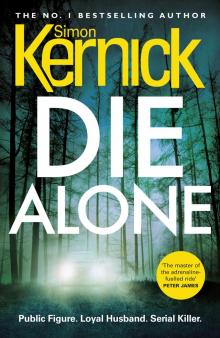 Die Alone
Die Alone Deadline
Deadline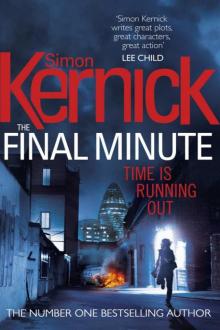 The Final Minute
The Final Minute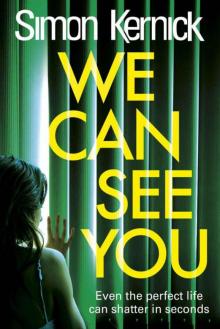 We Can See You
We Can See You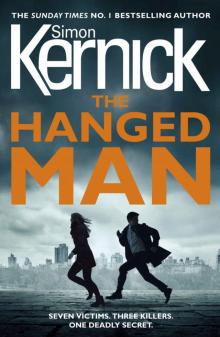 The Hanged Man (Bone Field 2)
The Hanged Man (Bone Field 2)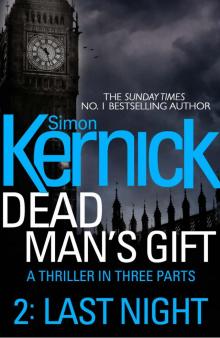 Dead Man's Gift 02 - Last Night
Dead Man's Gift 02 - Last Night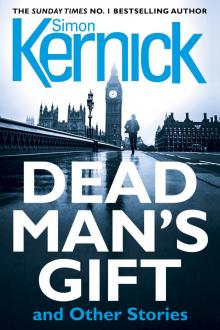 Dead Man's Gift and Other Stories
Dead Man's Gift and Other Stories A Good Day To Die
A Good Day To Die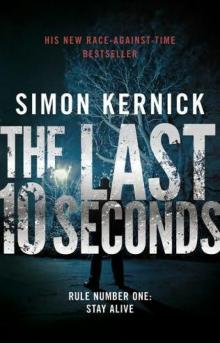 The Last 10 Seconds
The Last 10 Seconds The Murder Exchange
The Murder Exchange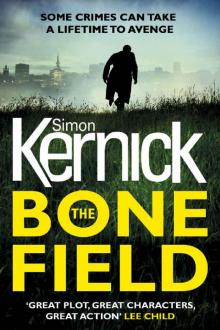 The Bone Field
The Bone Field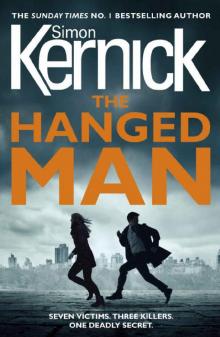 The Hanged Man
The Hanged Man Target
Target The Last 10 Seconds: A Novel
The Last 10 Seconds: A Novel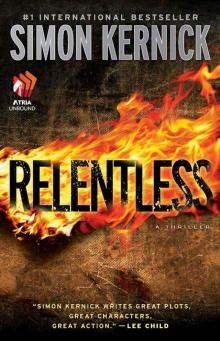 Relentless: A Novel
Relentless: A Novel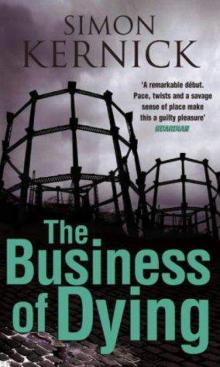 The Business Of Dying
The Business Of Dying Die Twice
Die Twice Flytrap
Flytrap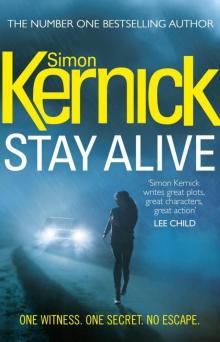 Stay Alive
Stay Alive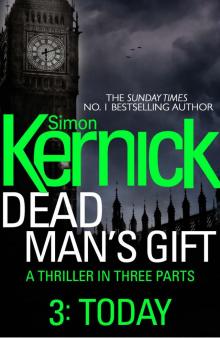 Dead Man's Gift 03 - Today
Dead Man's Gift 03 - Today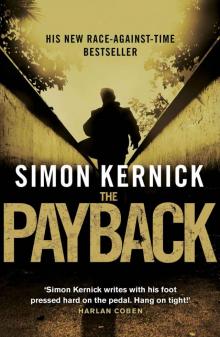 The Payback
The Payback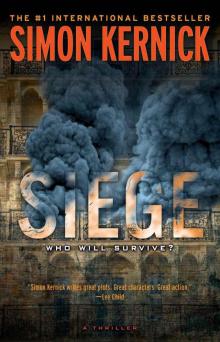 Siege: A Thriller
Siege: A Thriller The Crime Trade
The Crime Trade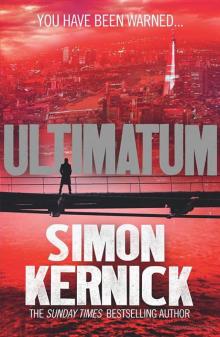 Ultimatum
Ultimatum